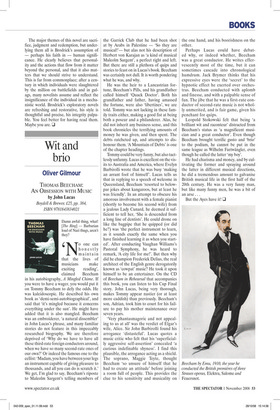Wit and brio
Oliver Gilmour
THOMAS BEECHAM: AN OBSESSION WITH MUSIC by John Lucas Boydell & Brewer, £25, pp. 384, ISBN 9781843834021 Damn awful thing, what! [The Ring] — Barbarian load of Nazi thugs, aren’t they?
No one can h o n e s t l y maintain that the lives of musicians make exciting reading’, claimed Beecham in his autobiography, A Mingled Chime. If you were to have a wager, you would put it on Tommy Beecham to defy the odds. He was kaleidoscopic. He described his own book as ‘demi-semi-autobiographical’, and said that ‘it’s mingled because it concerns everything under the sun’. He might have added that it is also mangled. Beecham was an embroiderer, ‘a natural dissembler’ in John Lucas’s phrase, and many familiar stories do not feature in this impeccably researched biography. We are therefore deprived of ‘Why do we have to have all these third-rate foreign conductors around, when we have so many second-rate ones of our own?’ Or indeed the famous one to the cellist: ‘Madam, you have between your legs an instrument capable of giving pleasure to thousands, and all you can do is scratch it.’ We get, I’m glad to say, Beecham’s riposte to Malcolm Sargent’s telling members of the Garrick Club that he had been shot at by Arabs in Palestine — ‘So they are musical!’— but alas not his description of Herbert von Karajan as ‘a kind of musical Malcolm Sargent’, a perfect right and left. But there are still a plethora of quips and stories to feast on in Lucas’s book. Beecham was certainly not dull. It is worth pondering what he was, and why.
He was the heir to a Lancastrian fortune, Beecham’s Pills, and his grandfather called himself ‘Quack Doctor’. Both his grandfather and father, having amassed the fortune, were also ‘libertines’, we are told. Tommy was not lacking in these family traits either, making a good fist at being both a poseur and a philanderer. Alas, he did not inherit any business sense, and this book chronicles the terrifying amounts of money he was given, and then spent. The debts ratcheted up, and attempts to dishonour them. ‘A Mountain of Debts’ is one of the chapter headings.
Tommy could be very funny, but also tactlessly unfunny. Lucas is excellent on the visits to Australia and America, where Evelyn Barbirolli wrote that he was busy ‘making an arrant fool of himself’. Lucas tells us that in replying to a speech of welcome in Queensland, Beecham ‘resorted to belowpar jokes about kangaroos, but at least he was friendly’. In an attempt to obscure his amorous involvement with a female pianist (shortly to become his second wife) from a jealous Lady Cunard, he deemed it sufficient to tell her, ‘She is descended from a long line of dentists’. He could drone on like the bagpipe that he quipped (or did he?) was ‘the perfect instrument to learn, as it sounds exactly the same when you have finished learning it as when you started’. After conducting Vaughan Williams’s Pastoral Symphony, he was heard to remark, ‘A city life for me!’. But then why did he champion Frederick Delius, the real architect of the English genre derogatorily known as ‘cowpat’ music? He took it upon himself to be an entertainer. On the CD of Beecham in Rehearsal that accompanies this book, you can listen to his Cup Final story. John Lucas, being very thorough, makes Tommy appear nastier (or at least more caddish) than previously. Beecham’s son, Adrian, took him to court for his failure to pay his mother maintenance over seven years.
‘Very phantasmagoric and not appealing to us at all’ was the verdict of Elgar’s wife, Alice. Sir John Barbirolli found his arrogance ‘distasteful’. Lucas quotes a music critic who felt that his ‘superficially aggressive self-assertion’ concealed ‘a curious indefinable shyness’. I find this plausible, the arrogance acting as a shield. The soprano, Maggie Teyte, thought Beecham ‘so unsure of himself that he had to create an attitude’ before joining a room full of people. This provides the clue to his sensitivity and musicality on the one hand, and his boorishness on the other.
Perhaps Lucas could have debated why, or indeed whether, Beecham was a great conductor. He writes effervescently most of the time, but it can sometimes cascade into chronological humdrum. Jack Brymer thinks that his expressive eyes were the ‘secret’ to the hypnotic effect he exerted over orchestras. Beecham conducted with aplomb and finesse, and with a palpable sense of fun. The jibe that he was a first-rate conductor of second-rate music is not wholly unmerited, and is fair game, given his penchant for quips.
Leopold Stokowski felt that being ‘a brilliant wit and raconteur’ distracted from Beecham’s status as ‘a magnificent musician and a great conductor’. Even though Beecham brought terrific gusto and ‘brio’ to the podium, he cannot be put in the same league as Wilhelm Furtwängler, even though he called the latter ‘my boy’.
He had charisma and money, and by cultivating the former and spraying around the latter in different musical directions, he did a tremendous amount to galvanise British musical life in the first half of the 20th century. He was a very funny man, but like many funny men, he was a bit of an arse . . .
But the Ayes have it! ❑


































































































 Previous page
Previous page